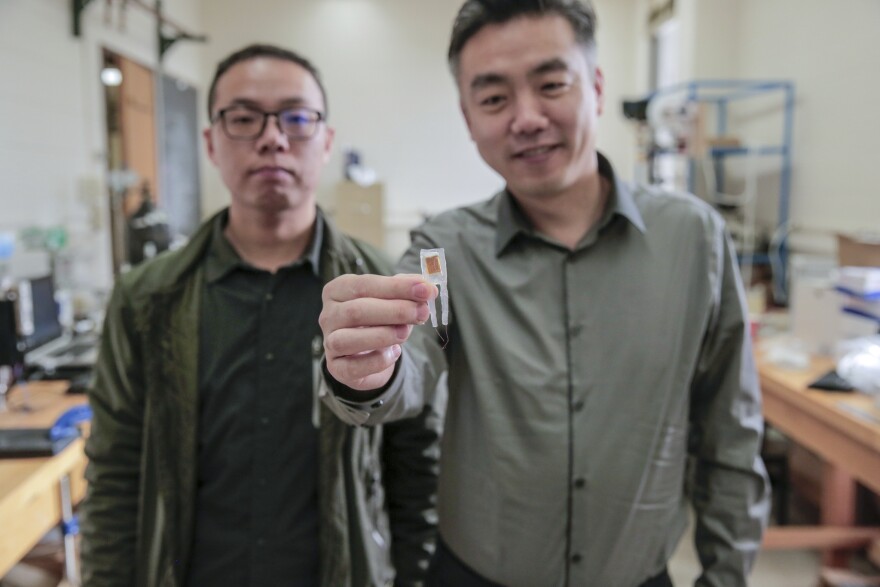It’s the new year, a time when many are turning to resolutions — including diets. Researchers at the University of Wisconsin-Madison are testing a new model of a weight loss intervention device. It zaps a nerve into making your stomach feel full so that you eat less.
Lead researcher Dr. Xudong Wang of UW-Madison has been developing the device. “[It] has two wires that connects to the vagus nerve," he says. "The device will generate small electrical pulses and stimulate the vagus nerve and tell the brain that the stomach is full and stop eating.”
Wang aims for it to be an improvement over a previous model, which is called VBLOC — from a company now called ReShape Lifesciences. He says the drawbacks of the VBLOC device are, for instance, that it needs to be recharged. Also, after two years of use, patients only lost, on average, about 20 percent of excess weight.
But Wang says his device is different.
“First, our device doesn’t need any battery or any electronics to control the pulse generation. So, our entire device is about 1-inch square with the thickness of about 1 millimeter, so it’s very thin and very small.” It’s about the size of a postage stamp.
“More importantly, our device responds to the stomach motion itself, so this means our device controls the food intake by the stomach movement,” he adds. The device charges itself off of the energy that it produces from the stomach, and decides when to ping the vagus nerve based on the stomach’s own movements. For that, Wang is calling on a decade of research on harvesting energy from the body’s own movements.
“We call it electro-static charge. You know like in the wintertime when you touch the car and there’s a shock that comes out, electric pulse that comes out. It’s similar to that kind of charge,” he says. In a 12-week trial, the new device helped rats shed 40 percent of their body weight — not just excess body weight.
The device is inserted via laparoscopic surgery, and it can be removed — unlike with gastric bypass surgery, which is permanent.
That all sounds good to 47-year-old Laura Wright in Colorado, who says she is obese according to her BMI. She contacted researchers to ask to be a part of a trial when the device is ready. She is a retired letter carrier from Castle Rock. Since she retired, she walks a lot less and cooks a lot more as a stay-at-home mom for her six sons.
“I’ve dieted, done the diet fads with co-workers at work," she says. "I’ll lose 10-15 pounds. But the minute you stop, it comes right back.”
Then her 25-year-old son sent her a press release on Wang’s device, and her curiosity was piqued.
“I thought, this is so amazing. There’s no pills, no drugs, no starving yourself. It’s safer than going to have your stomach cut.”
Still, clinical psychologist Dr. Stacey Nye, founding fellow of the Academy for Eating Disorders and director of the UW-Milwaukee Psychology Clinic, says not so fast. She says hunger is not the primary reason why people overeat.
"So, if someone’s overeating for emotional reasons, then something that’s going to signal fullness isn’t going to help them," she says. "Because they’re eating when they’re full anyway. If someone is eating for emotional reasons, they need help dealing with their emotions. They need coping skills rather than a device to tell them that they’re full."
Other experts agree that weight climbs on for many reasons, but that advancements to vagus nerve stimulators could be a jumpstart to shed the pounds. Dr. Larry Cheskin is director of the Weight Management Center at Johns Hopkins University before he heads to George Mason University.
He says if Wang’s device follows the trajectory from rats to humans, with devices like these, initial weight loss is likely, which can motivate people. “Early results are actually an important predictor of long-term results. if people get frustrated early on in doing a diet program, and they’re not losing weight very well, they’re likely to throw in the towel," he assesses.
"Whereas if they have good early results, they’re going to well not just short-term but longer-term, because they’ve, if you will, tasted success and know that they can do it," he says.
Whether researchers will “taste success” with their device remains to be seen. They have patented it and are moving forward to get the funding to test the device on pigs, with the aim of testing on humans.





